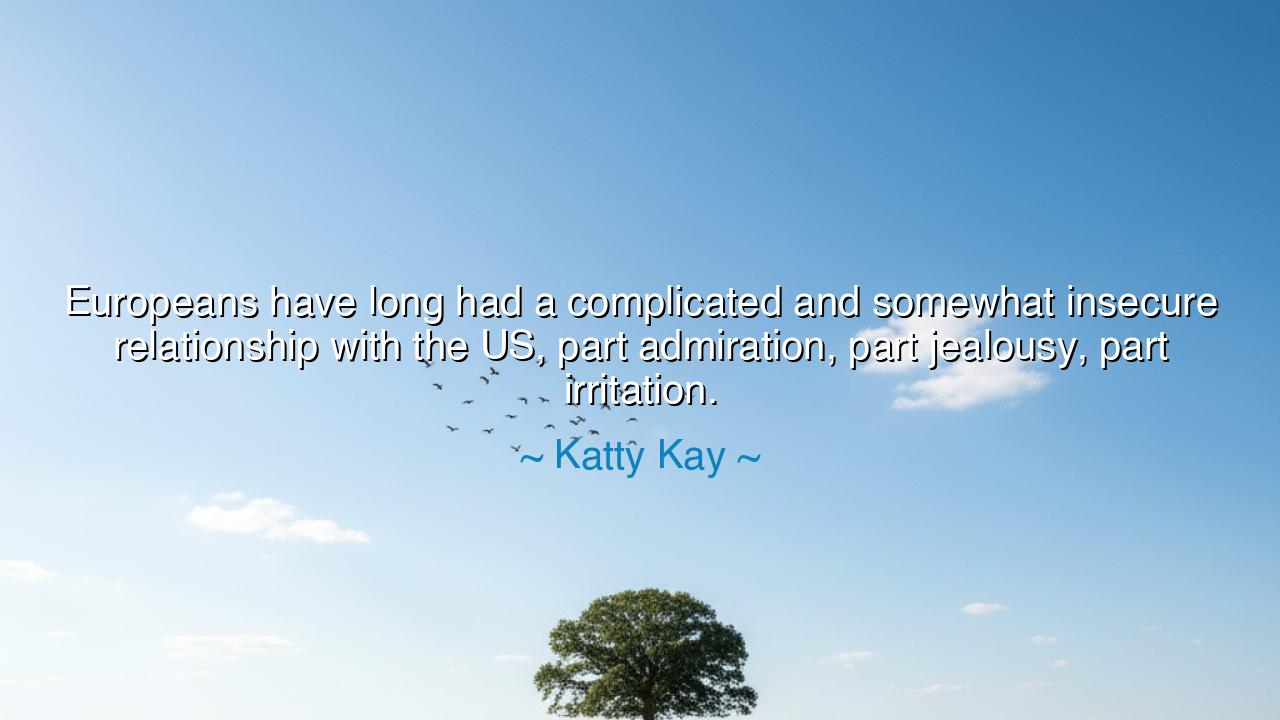
Europeans have long had a complicated and somewhat insecure
Europeans have long had a complicated and somewhat insecure relationship with the US, part admiration, part jealousy, part irritation.






In the discerning and eloquent words of Katty Kay, “Europeans have long had a complicated and somewhat insecure relationship with the US, part admiration, part jealousy, part irritation.” These words, though modern in their utterance, speak to a timeless truth about nations, peoples, and the complex dance between power and pride. For beneath the surface of politics and culture lies the eternal human paradox — that we often envy what we admire, and we are often irritated by what we cannot control. In this single observation, Kay reveals not only the relationship between continents but the very rhythm of history itself — the interplay of admiration, jealousy, and irritation that defines every great rivalry and every enduring partnership.
The origin of this quote rests in the long and intertwined story of Europe and the United States — two worlds separated by an ocean, yet bound by blood, heritage, and destiny. The United States was born from Europe’s old empires, its settlers carrying both the wisdom and the wounds of the Old World into the New. From those roots sprang a nation that rose swiftly — too swiftly, perhaps — to power and prosperity. Europe, with its centuries of art, philosophy, and empire, looked across the Atlantic and saw both a child and a challenger. It saw in America a mirror — reflecting its own ideals of freedom and progress — yet magnified and reimagined in ways that stirred both admiration and unease.
Indeed, since the dawn of the modern age, this tension has endured. After the Second World War, when Europe lay in ruins, it was the United States that rose as the great benefactor and protector, rebuilding what had been broken. The Marshall Plan, that grand gesture of aid, fed both gratitude and resentment. Europe admired America’s generosity, yet envied its might. To depend upon another is to be humbled, even when that dependence saves you. And so the relationship became as Kay described: complicated — a blend of affection and pride, of shared ideals and quiet rivalry.
There is an ancient echo in this modern story. Consider the tale of Athens and Sparta, two mighty city-states of ancient Greece. Athens, rich in art and intellect, looked upon Sparta’s discipline and power with both fear and envy; Sparta, in turn, respected Athens’ brilliance yet despised its arrogance. Their alliance defeated the Persian Empire, yet soon after, jealousy and irritation tore them apart. So too, Europe and America — allies in war, rivals in peace — have long reflected each other’s virtues and vices. Both cherish liberty; both prize progress; both believe themselves exceptional. And in that shared belief lies the seed of their tension.
Admiration, when left untempered, breeds jealousy; and jealousy, when left unchecked, breeds irritation. Europe, rich in culture and history, sometimes sees in America a youth too loud, too bold, too sure of itself. America, born of revolution, sees in Europe a civilization too cautious, too bound by the weight of tradition. Yet beneath these judgments lies mutual fascination — the artist watching the warrior, the scholar watching the pioneer. Both sides long to learn from the other, even as they deny the need. Katty Kay’s words thus capture the eternal tension between the seasoned and the new, the refined and the restless — a dynamic that drives both conflict and creativity.
And yet, from this complicated relationship has come much good. The partnership between Europe and the United States has shaped the modern world — through alliance, commerce, and culture. When the world trembled in the shadow of tyranny, they stood together. When science, music, and philosophy advanced, they inspired one another. It is as if two great rivers, born of the same mountain, have taken different courses but still feed the same ocean. Their rivalry has not weakened civilization; it has strengthened it, for from the tension between admiration and jealousy arises the spark of achievement.
The lesson, dear listener, is one that transcends nations. Whether in politics, friendship, or love, relationships built upon admiration and competition must be tempered by humility and understanding. It is natural to feel envy toward those who succeed; it is human to bristle at those who remind us of our own limits. But wisdom lies in transforming envy into inspiration, and irritation into respect. Let nations, like people, learn to celebrate difference, to balance pride with partnership, and to recognize that greatness shared is greatness multiplied.
So let the words of Katty Kay stand as both mirror and guide: that admiration, jealousy, and irritation are not enemies, but forces to be understood and harnessed. They are the tides that move nations forward when governed by wisdom, and drown them when ruled by pride. The bond between Europe and America endures not because it is simple, but because it is profound — a living example of how tension, when rooted in respect, can give birth to progress. And so it is with all human ties: where there is both admiration and challenge, there lies the seed of growth, and in that growth, the promise of greatness.






AAdministratorAdministrator
Welcome, honored guests. Please leave a comment, we will respond soon